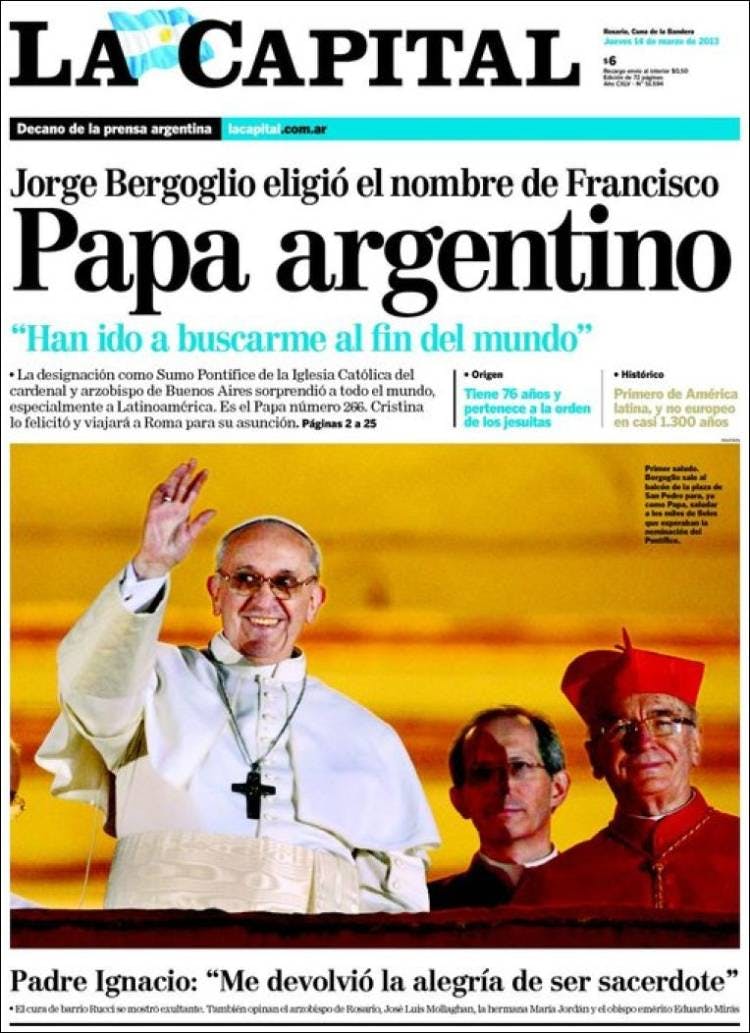OK, they’ve probably never met, but it strikes me as interesting how two “turnaround” leaders of embroiled organizations, took wildly different approaches, yielding very different results.
No one will deny that JCPenney and the Catholic Church have had a run of bad years.
JCPenney stock was down and market share was shrinking, losing ground to Kohl’s and T.J. Maxx. The Catholic Church had been trying to shrug off the weight of scandal for decades and unify an increasingly diverse flock.
Each organization brought in new leadership to effect radical change.
Ron Johnson, the wunderkind behind Apple retail stores and Target, on paper, seemed like the white knight to JCPenney’s floundering princess. Pope Francis represented the new face of modern Catholics and was unmarred by the molestation scandals dogging Europe and North America.
Some 17 months later, Ron Johnson was chased out by the peasants with pitchforks while huge crowds welcome Pope Francis and non-Catholics are taking notice of his words. Admittedly Pope Francis has an advantage with the infallibility thing, but he seems to have achieved a level of influence that his predecessors did not.
1. Dance with the one that Brung ‘Ya
Ron Johnson came with bold ideas – branded stores within each retail outlet, fewer sales in favor of everyday low pricing, ditching long-standing brands, and no more coupons. Every effort was trying to bring chic to JCPenney.
None of these, on the surface, was a bad idea. The problem is that Johnson attempted to change JCPenney’s brand without changing the internal culture to support it. There was no attempt to inspire employees or bring them along on the vision; nevermind that the changes weren’t adequately vetted with customers.
Pope Francis, on the other hand, is seeking to change the internal culture of “Vatican narcissism” by getting back to basics. He’s cleaning house and reducing bureaucracy. He’s appealing to the clergy to return to the Church’s mission: “the care of souls … and service of people …” and reaching out to populations previously excluded in an effort to remain relevant.
2. Stick to your knitting
Ron Johnson led with the bold sacrifice of sacred cows (coupons, sales, favorite brands), but Pope Francis did exactly the opposite. About controversial, wedge issues, such as gay marriage and abortion, he simply said too much time was spent on them.
He refused to use them as deflections from the Church’s core mission of “preaching peace,” a message everyone could get behind. Pope Francis effected as much change in the Church by what he didn’t say or do as what he did.
3. Get your message out
Johnson allegedly bullied his management and ignored his core shoppers. Johnson’s attitude to his core customer was if they didn’t like the changes, he’d find people who would.
Pope Francis is the most talked about name on the planet. According to Global Language Monitor, “the Pope is the Internet’s top name, the Pope’s Twitter handle, @Pontifex, was the fourth most talked about word thus far in 2013.” Pope Francis poses for selfies with teens and calls up atheist reporters for chats.
4. Know where your bread will be buttered
Rather than cater to the existing customer and bring them along on a re-fresh, Ron Johnson assumed his flock would come to him – urban hipster Target shoppers would discover JCPenney. Instead he sacrificed his core customer for one that never showed up.
Pope Francis, rather, recognized the changing demographic for the future longevity of the Church – a younger, more tech-savvy population with increasing representation from Latin America. He started reaching them through the Internet and talking about issues that mattered to them, like social justice, putting aside issues that put them in conflict with their faith and their politics.
JCPenney has lost $1 billion and a third of its customers. It has reinstated its previous CEO, as a signal it is erasing all traces of the Johnson era. It remains to be seen if the 111-year-old retailer will survive the experiment.
Meanwhile, Catholic churches report pews are filling up, there is a resurgence in the popularity of the name Francis, and non-Catholics are taking note and recognizing the relevance of the Pope’s message.
Sure, a few thousand years of history and infallibility don’t hurt, but Pope Francis might just be the knight in a white Renault that the Catholic Church needs.
This was originally published on PeopleResult’s Current blog.
